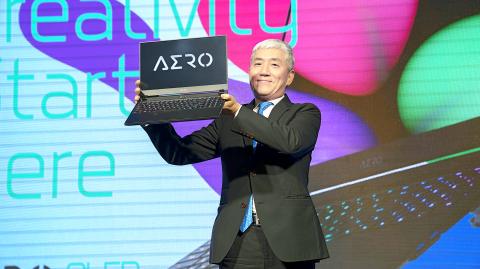Gigabyte Technology Co Ltd (技嘉) yesterday said it aims to tap the fast-developing content creators’ market as it launched its new AERO series of laptops on the first day of Computex Taipei.
With the new laptop series, Gigabyte hopes to improve the marketing of its notebooks, while also looking to redefine the PC industry, chairman Dandy Yeh (葉培城) said at the launch.
The AERO series is designed to please users’ eyes, Gigabyte mobility business center vice president Steven Chen (陳俊丞) said.

Photo: Wu Pei-hua, Taipei Times
The PC market has gradually become saturated with performance-driven laptops and so the focus is slowly shifting back to being user-friendly and visually pleasing, he said.
“The easier [a laptop] is to use, the more people would appreciate it,” Chen said.
“Most content creators do not care about the hardware, but about the interface,” he added.
Intel Corp general manager of premium and laptop segments Frederik Hamberger said that while most major PC manufacturers still have their eyes set on the gaming segment of the PC market, the content creators’ market segment is rapidly expanding, reaching more than 130 million users to date, compared with 580 million paying PC gamers.
Although content creators represent a significant market potential, the market used to ignore the demand, Hamberger said.
“Three or four years ago, when content creators would go into a [PC] shop, they would be directed to the gaming laptops if they’re lucky,” he said at the launch.
Many content creators purchased gaming laptops, as few other options were available, he said.
Just 29 percent of users purchase gaming laptops for gaming, while up to 19 percent purchase gaming laptops for content creation only, Hamberger added.
Gigabyte’s new AERO 15 uses Microsoft Corp’s cloud computing service, Microsoft Azure, which would collect users’ data and automatically reconfigure the laptops to adapt to content creators’ different needs, Microsoft vice president for worldwide device sales Alvaro Celis said.

Six Taiwanese companies, including contract chipmaker Taiwan Semiconductor Manufacturing Co. (TSMC), made the 2025 Fortune Global 500 list of the world’s largest firms by revenue. In a report published by New York-based Fortune magazine on Tuesday, Hon Hai Precision Industry Co. (better known as Foxconn) ranked highest among Taiwanese firms, placing 28th with revenue of US$213.69 billion. Up 60 spots from last year, TSMC rose 60 places to reach No. 126 with US$90.16 billion in revenue, followed by Quanta Computer Inc. at 348th, Pegatron Corp. at 461st, CPC Corp., Taiwan at 494th and Wistron Corp. at 496th. According to Fortune, the world’s

NEW PRODUCTS: MediaTek plans to roll out new products this quarter, including a flagship mobile phone chip and a GB10 chip that it is codeveloping with Nvidia Corp MediaTek Inc (聯發科) yesterday projected that revenue this quarter would dip by 7 to 13 percent to between NT$130.1 billion and NT$140 billion (US$4.38 billion and US$4.71 billion), compared with NT$150.37 billion last quarter, which it attributed to subdued front-loading demand and unfavorable foreign exchange rates. The Hsinchu-based chip designer said that the forecast factored in the negative effects of an estimated 6 percent appreciation of the New Taiwan dollar against the greenback. “As some demand has been pulled into the first half of the year and resulted in a different quarterly pattern, we expect the third quarter revenue to decline sequentially,”

WEAKER ACTIVITY: The sharpest deterioration was seen in the electronics and optical components sector, with the production index falling 13.2 points to 44.5 Taiwan’s manufacturing sector last month contracted for a second consecutive month, with the purchasing managers’ index (PMI) slipping to 48, reflecting ongoing caution over trade uncertainties, the Chung-Hua Institution for Economic Research (CIER, 中華經濟研究院) said yesterday. The decline reflects growing caution among companies amid uncertainty surrounding US tariffs, semiconductor duties and automotive import levies, and it is also likely linked to fading front-loading activity, CIER president Lien Hsien-ming (連賢明) said. “Some clients have started shifting orders to Southeast Asian countries where tariff regimes are already clear,” Lien told a news conference. Firms across the supply chain are also lowering stock levels to mitigate

DIVERSIFYING: Taiwanese investors are reassessing their preference for US dollar assets and moving toward Europe amid a global shift away from the greenback Taiwanese investors are reassessing their long-held preference for US-dollar assets, shifting their bets to Europe in the latest move by global investors away from the greenback. Taiwanese funds holding European assets have seen an influx of investments recently, pushing their combined value to NT$13.7 billion (US$461 million) as of the end of last month, the highest since 2019, according to data compiled by Bloomberg. Over the first half of this year, Taiwanese investors have also poured NT$14.1 billion into Europe-focused funds based overseas, bringing total assets up to NT$134.8 billion, according to data from the Securities Investment Trust and Consulting Association (SITCA),